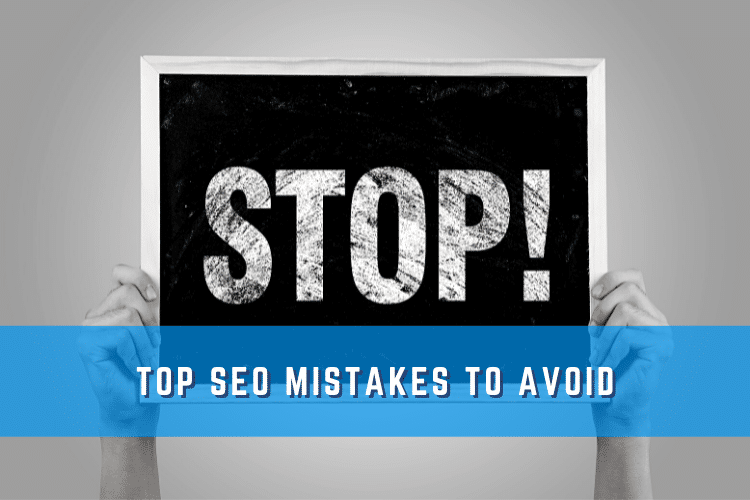Looking to Dominate the Search Results? Avoid These Common SEO Mistakes!
The world of optimizing websites for search has come a long way over the last 20 years. All it took was repeating a keyword repeatedly on your website to achieve top rankings in the early days. Heck, you could stuff the codebase with keywords and outrank your competition.
Today, search engine optimization (SEO) is a little more complex, which leads to confusion when optimizing a site for search. When we set out to optimize a new partner’s website, we often see some easily correctable mistakes that might be holding back the site’s potential.
Here we’ll cover a few of the most common SEO mistakes to avoid and some simple SEO efforts to get you on the right track.
Neglecting A Mobile-First Internet
We still often see a business website that hasn’t prioritized a mobile-first website. This is a major no-no when attempting to improve your website’s online presence and search engine rankings.
As of 2019, Google’s algorithm has taken a mobile-first approach to index and rank websites. With most internet users browsing on mobile devices, Google and many search engines prioritize sites that deliver a friendly user experience on mobile. So if your website has a poor user experience for your customers, you might start seeing less and less of them on your website.
Ignoring Your Reviews; Good, Bad, or Ugly
Another area of neglect we sometimes see with our partners is around reviews. But it’s not in getting the reviews; it’s answering them.
We all love seeing the positive reviews pour in from our satisfied customers. When they come in, be sure to reply right away! And when you do, use industry terms and phrases because review responses are one of the many ranking factors that Google looks at for their search algorithm.
For negative reviews, you still need to reply to them! 45% of consumers say they’re more likely to visit a business if it responds to negative reviews. We get it; negative reviews are an emotional topic—someone has decided to attack your company or its employees personally. But politely answering a negative review is vitally important to your business’s online reputation, even if the review paints a bad picture.
And when you get negative reviews, the best thing to do is continually generating new reviews for your business.
Name, Address, and Phone Number Inconsistencies Online
If you’ve been a long-standing business online, with numerous locations or multiple phone numbers, your information is likely not consistent in online website directories around the web. Many of these directories update automatically or don’t update at all, meaning any changes you have made to your business aren’t accurate anymore.
Having your name, address, and phone number consistent across the web is vital to a strong SEO strategy. Google heavily weighs accurate information in its indexing and ranking algorithm. When several different websites and directories all have the same information, Google feels comfortable prioritizing your business over others for a search term.
Missing Alt Text On Your Website Images
Following Google’s best practices surrounding images, Alt Text is a necessary piece of metadata to complete for most of the photos on your website. If you’re a business, you’re also required to follow specific guidelines to be ADA Compliant. This means that when individuals with visual or hearing impairments visit your site, they can see images or have images descriptions read to them and understand what your business is all about.
But how does this affect SEO?
As we mentioned earlier, Google heavily values accurate information and often rewards those following their best practices. By adding helpful, descriptive text to the Alt Text area, Google can better understand your images and what you are trying to convey on your page. When Google better understands your website, it rewards you with better rankings.
Thin Content
With the introduction of BERT, Google improves its understanding of the web, web content, and its users’ search intent. It can better identify information and accuracy and the context of the words on your page.
What does that mean for your content?
It means it’s no longer enough for your website’s pages to hold just a few words about who you are, what you do, or what you offer. It’s been that way on Google since 2011’s Panda update, which began penalizing low-quality pages that were dominating search engine results. But Google’s BERT update goes even further to look for the words around the relevant keywords you optimize for, not just the words at face value.
But don’t go thinking you need 2000 words per page to rank either—you need accurate, thorough information on your pages; if you feel you can accomplish this goal in 300 words, great! Need 800-1000 words? Ok! Just make sure you have high-quality content that covers your topics thoroughly, and Google will do the rest.
About the Author
Jordan Adams is an Account Executive at ChoiceLocal with specialties in Search Engine Optimization and WordPress CMS. In his spare time, he enjoys golfing, gaming, trying new foods and restaurants with his wife, and spending time with his two children Parker and Violet.


